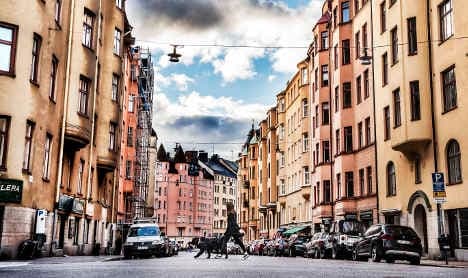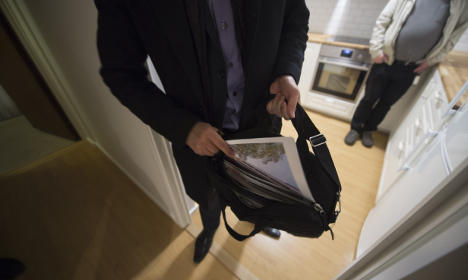Property prices rocket despite crash warning

Sweden's housing market is continuing to heat up, despite warnings from top economists that the situation is a bubble waiting to burst.
The cost of buying an apartment in a shared building has risen by three percent over the past month and prices across the country have gone up by 14 percent compared to last year, according to new figures from Svensk Mäklarstatistik, a Swedish agency which measures real estate agent sales.
The average price per square metre of property in Sweden is now more than 36,000 kronor ($4,430) the highest figure in Swedish history, Svensk Mäklarstatistik reports.
Gothenburg has seen the greatest increase in prices, with a rise of 21 percent for apartments in the city and its outer suburbs over the last 12 months. Those hoping to buy their own house in the city are facing prices 15 percent higher than a year ago.
But central Stockholm remains the most expensive location, with an apartment now costing almost 90 000 kronor ($11,076) per square metre.
News of the hike in prices comes just a week after the country’s National Institute of Economic Research (NIER) warned that the market could soon end up crashing.
"There is a significant risk that prices are at unsustainable levels,” NIER’s director Mats Dillen told Swedish broadcaster SVT at the time.
“We are now starting to worry (…) we have to slow down the development of house prices (…) If we don't try to slow this trend there is a risk that there will be an abrupt fall in prices later, a crash,” he said.

A property viewing in Stockholm. Photo: Fredrik Sandberg/TT
Hans Lindberg, a Professor of Real Estate at KTH University in Stockholm, told the TT news agency on Tuesday that he felt the decision by Sweden's central bank (The Riksbank) to cut interest rates to below zero had been a major factor in allowing a housing bubble to form.
"If the Riksbank had not cut interest rates in this way in the past year and promised a low interest rate over a long period this would not have occured. It is the Riksbank that is the villain," he said.
The Riksbank has long argued that keeping rates low will encourage inflation in Sweden (where the prices of everyday goods and services have been stagnant for the past few years) which it says will inject more money into the country's economy.
Howver Lindberg told TT that he agreed with the NIER's concerns and said that politicians needed to do more to ensure that more affordable properties are built.
"You have to force municipalities to plan more land [for this]. And it's about building places that people with lower incomes can afford," he argued.
Prime Minister Stefan Löfven's government has promised to set aside 5.5 billion kronor ($665m) for various housing projects in 2016, if his budget gets passed by parliament later this month.
“It's the biggest housing political investment in 20 years in Sweden," said Finance Minister Magdalena Andersson last month.
Comments
See Also
The cost of buying an apartment in a shared building has risen by three percent over the past month and prices across the country have gone up by 14 percent compared to last year, according to new figures from Svensk Mäklarstatistik, a Swedish agency which measures real estate agent sales.
The average price per square metre of property in Sweden is now more than 36,000 kronor ($4,430) the highest figure in Swedish history, Svensk Mäklarstatistik reports.
Gothenburg has seen the greatest increase in prices, with a rise of 21 percent for apartments in the city and its outer suburbs over the last 12 months. Those hoping to buy their own house in the city are facing prices 15 percent higher than a year ago.
But central Stockholm remains the most expensive location, with an apartment now costing almost 90 000 kronor ($11,076) per square metre.
News of the hike in prices comes just a week after the country’s National Institute of Economic Research (NIER) warned that the market could soon end up crashing.
"There is a significant risk that prices are at unsustainable levels,” NIER’s director Mats Dillen told Swedish broadcaster SVT at the time.
“We are now starting to worry (…) we have to slow down the development of house prices (…) If we don't try to slow this trend there is a risk that there will be an abrupt fall in prices later, a crash,” he said.

A property viewing in Stockholm. Photo: Fredrik Sandberg/TT
Hans Lindberg, a Professor of Real Estate at KTH University in Stockholm, told the TT news agency on Tuesday that he felt the decision by Sweden's central bank (The Riksbank) to cut interest rates to below zero had been a major factor in allowing a housing bubble to form.
"If the Riksbank had not cut interest rates in this way in the past year and promised a low interest rate over a long period this would not have occured. It is the Riksbank that is the villain," he said.
The Riksbank has long argued that keeping rates low will encourage inflation in Sweden (where the prices of everyday goods and services have been stagnant for the past few years) which it says will inject more money into the country's economy.
Howver Lindberg told TT that he agreed with the NIER's concerns and said that politicians needed to do more to ensure that more affordable properties are built.
"You have to force municipalities to plan more land [for this]. And it's about building places that people with lower incomes can afford," he argued.
Prime Minister Stefan Löfven's government has promised to set aside 5.5 billion kronor ($665m) for various housing projects in 2016, if his budget gets passed by parliament later this month.
“It's the biggest housing political investment in 20 years in Sweden," said Finance Minister Magdalena Andersson last month.
Join the conversation in our comments section below. Share your own views and experience and if you have a question or suggestion for our journalists then email us at [email protected].
Please keep comments civil, constructive and on topic – and make sure to read our terms of use before getting involved.
Please log in here to leave a comment.